New Book Bihar Board Class 6 English Chapter 3 Solutions are available here. This provides all questions and answers of chapter 3 – “Rama to the Rescue” for free. It follows the new English Book of Bihar Board Class 6 – Poorvi.
Rama to the Rescue is a clever story about a village couple who outsmart a thief. One night, they hear a thief trying to break into their house. Instead of panicking, the wife comes up with a smart plan. They pretend to call out for “Rama” (the village watchman) in different ways, tricking the thief into thinking help is coming. Their quick thinking saves them, and the real Rama catches the thief! Below are the Bihar Board Class 6 English Chapter 3 – Rama to the Rescue Question Answers to help you understand the story better.
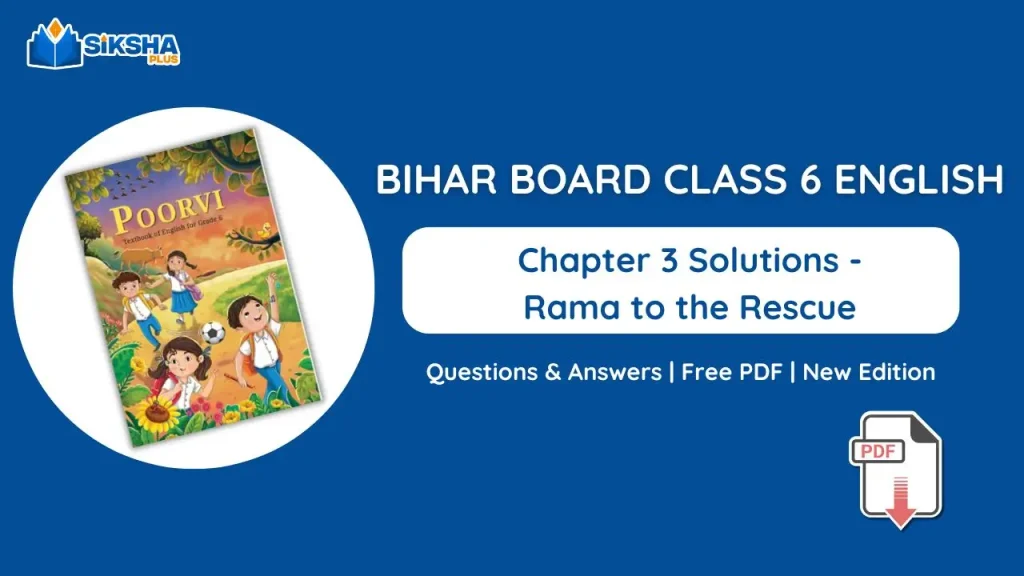
Bihar Board Class 6 English Chapter 3 Solutions
Contents
| Class | 6 |
| Subject | English (Poorvi) |
| Chapter | 3. Rama to the Rescue |
| Board | Bihar Board |
ACTIVITIES BEFORE WE READ
1. Identify the following people. How do they help us when we are in trouble?
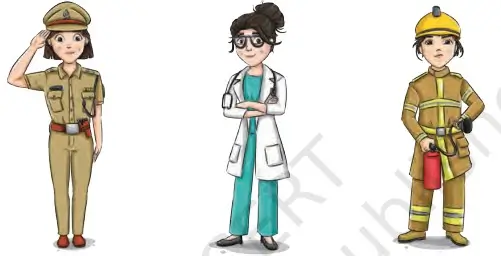
Ans:
- Police – Help us by keeping our house and lives safe.
- Doctor – Treat our health.
- Fire Fighter – Help us in case of fire.
2. Choose the correct option to complete the sentence. The word ‘rescue’ means to ……….
(a) Make fun of someone
(b) Save someone
(c) Ask someone for help
Ans: (b) Save someone.
3. Work in pairs
Put a tick mark at the end of the phrases describing those who need to be rescued. Share your answers with your teacher and classmates.
(a) A man stuck in a building on fire.
Ans: ✓
(b) A woman buying vegetables in the market.
Ans: ✗
(c) A dog who has hurt its leg.
Ans: ✓
(d) A tree being cut down in a forest.
Ans: ✓
4. The policeman in the story you are about to read is called the kotwal. Some people call him thaanedar. What do you call a policeman in your language? Share it with your classmates and teacher.
Ans: In our language, we call a policeman “daroga ji”.
5. Imagine you are alone at home and you face a problem. Answer the following questions and share your answers with your teacher and classmates.
(a) Will you solve the problem yourself or wait for someone to help you?
Ans: It depends on the nature of the problem. If it’s something I can handle safely, I will try to solve it myself. If it’s more serious or dangerous, I will wait for help.
(b) How will you deal with the problem? Give a reason.
(i) Be worried about the problem and give up.
(ii) Feel angry that only you have the problem.
(iii) Think quickly about ways to solve the problem.
Ans: (iii) Think quickly about ways to solve the problem.
Reason: It’s important to stay calm and think clearly when facing a problem. Getting worried or angry won’t help fix anything. By thinking of solutions, I can either solve the problem myself or know exactly what help I need.
Let us discuss
From page number 22.
Circle the odd one –
1. The characters are: husband, wife, children.
Ans: Children
2. Who entered the house?: guest, robber, Kotwal.
Ans: Robber.
Let us discuss
From page number 23.
Write whether True or False.
1. The man tells his plan to his wife.
Ans: True
2. The thief wants to know where they kept their jewels.
Ans: True
Let us discuss
From page number 24.
1. Along with your classmates, call out the name ‘Rama’– softly, loudly and very loudly.
Ans: Please do with your classmates.
2. What do you think will happen next in the story?
Ans: I think Rama, the kotwal, will hear his name being called and come to help. He might catch the thief who has entered the house. The man and his wife will be saved from danger because of their clever plan to call for help.
Let us discuss
From page number 25.
1. Work in pairs to match the words in Column A with the meanings in Column B. Check your answers by sharing them with your teacher and classmates.
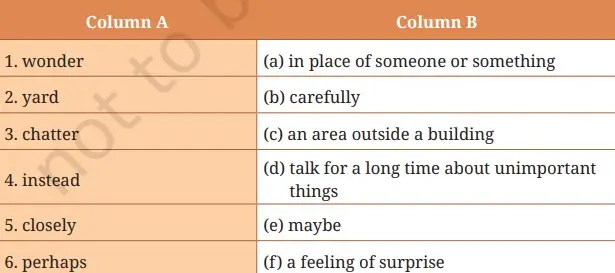
Ans:
| Column A | Column B |
|---|---|
| 1. wonder | (f) a feeling of surprise |
| 2. yard | (c) an area outside a building |
| 3. chatter | (d) talk for a long time about unimportant things |
| 4. instead | (a) in place of someone or something |
| 5. closely | (b) carefully |
| 6. perhaps | (e) maybe |
2. Fill in the boxes with suitable words as you read the story.
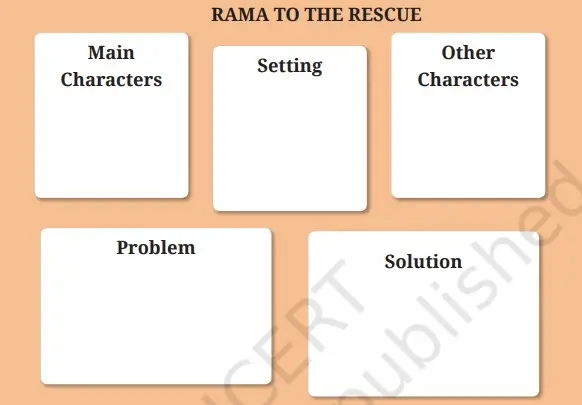
Ans:
Main Characters: Man, wife, Rama
Setting: In a Village
Other Characters: Thief
Problem: The thief was trying to find out the location of the money to steal it
Solution: The wife started calling out Rama, the village Kotwal’s name. He heard his name and caught the thief.
LET US THINK AND REFLECT
1. Read the following lines and then answer the questions that follow.
(a) Man: What’s the matter? What are you looking at?
Wife: Ssssh! Listen!
Man: Somebody is trying to get in.
Wife: I … I think he has got in … the noise has stopped.
(i) What makes the man say the first line?
Ans: The man says the first line because he notices his wife suddenly becoming alert and looking toward something with worry on her face. He is confused about why she is acting this way.
(ii) Choose the correct option.
The wife says ‘Ssssh! Listen!’. What does the word ‘Ssssh’ mean here?
(a) Sleep.
(b) Help.
(c) Rest.
(d) Be silent.
Ans: (d) Be silent.
(iii) How can you tell that the wife was listening carefully?
Ans: We can tell the wife was listening carefully because she noticed when the noise stopped. She was paying close attention to the sounds and could tell the difference between someone trying to get in and someone who had already entered the house.
(b) Rama, the village kotwal, ran to the house from which he heard his name being called.
Rama: Oh, Oh! Some thief has dug his way into this house.
(i) Fill in the blank with the correct word from the given lines.
The villagers caught the thief and took him to the ………
Ans: Police Station
(ii) Choose the correct option.
What do the words “Oh, Oh!” show here?
(a) surprise
(b) Anger
(c) pain
(d) Happiness
Ans: (a) surprise
(iii) How can you tell that the kotwal was good at his job?
Ans: The kotwal was good at his job because he came quickly when he heard his name being called. He was alert even at night and ready to help the villagers when they were in danger. He also managed to catch the thief successfully.
2. Give one reason why the man and his wife were not able to fall asleep.
Ans: The man and his wife could not fall asleep because they heard strange noises that made them think someone was breaking into their house. The unusual sounds made them worried and alert.
3. What did the thief wish would happen? Did it happen?
Ans: The thief wished that the man and his wife would talk about where they kept their valuable things like jewelry and money. Yes, it did happen, but it was a clever trick. They were actually calling for the kotwal named Rama while pretending to discuss their valuables.
4. How did the man and his wife get help from the kotwal?
Ans: The man and his wife got help from the kotwal by cleverly repeating his name “Rama” in their conversation. They pretended to be talking about naming their child, but they were actually calling for help. The kotwal heard them calling his name and came to help catch the thief.
5. Do you think cleverness can help us solve our problems? Why do you say so?
Ans: Yes, cleverness can help us solve problems. When we use our brain and think of smart ideas, we can find ways out of difficult situations. The man and his wife in the story used their cleverness to call for help without alerting the thief.
LET US LEARN
1. Study the highlighted words in the following lines.
- I’m feeling so sleepy.
- It’s a thief.
- They’re awake.
The highlighted words given in the above sentences have one letter missing in each. What are they? Share them with your teacher and Classmates.
Ans: The highlighted words in the sentences are contractions
Now, write the full words with the missing letter.
(a) ………. feeling so sleepy…
Ans: I am feeling
(b) ………. a thief.
Ans: It is
(c) ………. awake.
Ans: They are
2. Expand the following words. Two examples have been done for you. Use the contracted form of these words in sentences of your own.
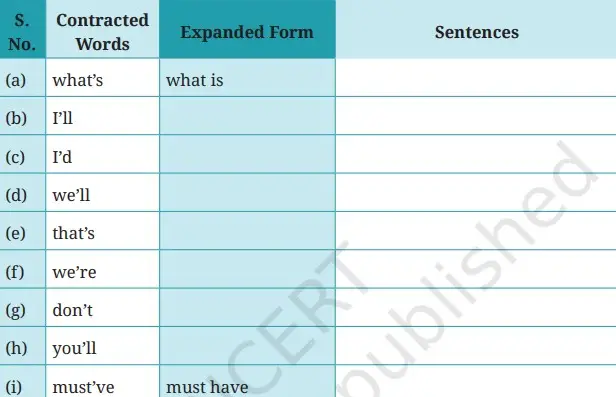
Ans:
| S.N. | Contracted Words | Expanded Form | Sentences |
|---|---|---|---|
| a | what’s | what is | What’s your favorite color? |
| b | I’ll | I will | I’ll help you with your homework. |
| c | I’d | I would | I’d like to eat ice cream. |
| d | we’ll | we will | We’ll go to the park tomorrow. |
| e | that’s | that is | That’s my new pencil box. |
| f | we’re | we are | We’re going to school now. |
| g | don’t | do not | I don’t like bitter foods. |
| h | you’ll | you will | You’ll enjoy this story book. |
| i | must’ve | must have | They must’ve reached home by now. |
3. Study the highlighted words and the words in the brackets in the following sentences from the story.
(a) I am feeling so sleepy. [am + feel + ing].
(b) What are you looking at? [are + look + ing].
(c) Somebody is trying to get in. [is + try + ing].
(d) They are saying something. [are + say + ing].
(e) Perhaps, they are talking about their money. [are + talk + ing].
Now, choose the correct option.
The sentences (a)-(e) refer to actions that ……….
(are going on at the time of speaking/happened in the past/will take place in the future)
Ans: The sentences (a) – (e) refer to actions that are going on at the time of speaking.
4. Fill in the blanks to complete the following sentences.
(a) I ………. in Grade 6. [am + study + ing]
Ans: I am studying in Grade 6.
(b) My friend ………. a story book. [is + read + ing]
Ans: My friend is reading a storybook.
(c) We ………. a board game. [are + play + ing]
Ans: We are playing a board game.
(d) I ………. a new language. [am + learn + ing]
Ans: I am learning a new language.
(e) The teachers ………. in the staff room. [are + sit + ing]
Ans: The teachers are sitting in the staff room.
(f) My mother ……….food in the kitchen. [is + cook + ing]
Ans: My mother is cooking food in the kitchen.
5. Study the following picture and fill in the blanks with the present progressive form of verbs.
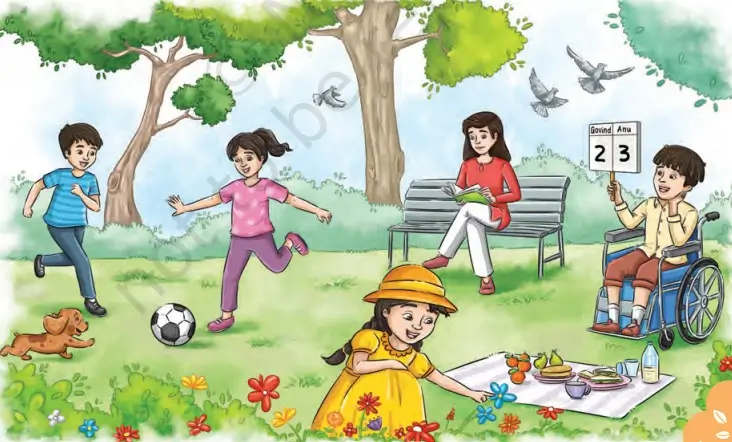
(a) Govind and Anu ………. football.
(b) Pema ………. flowers.
(c) Anil ………. the score card.
(d) The mother ………. a book.
(e) The dog ………. to catch the ball.
(f) The birds ………. in the sky.
Ans:
(a) Govind and Anu are playing football.
(b) Pema is plucking flowers.
(c) Anil is showing the score card.
(d) The mother is reading a book.
(e) The dog is running to catch the ball.
(f) The birds are flying in the sky.
6. Study the following sentences from the story and complete the table. One example has been done for you.
(a) I’d better listen closely.
(b) When he’s in the house, I’ll call out softly to him.
(c) Then I’ll call out very loudly
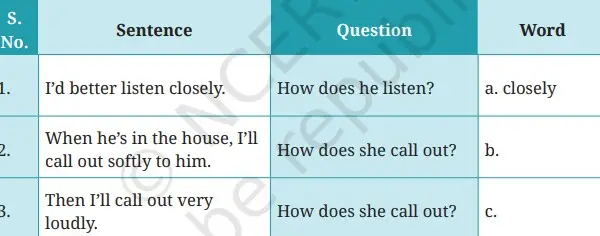
Ans:
- (b) softly
- (c) loudly
7. Fill in the blanks with suitable adverbs from the box given below. There are two extra words that you do not need.
warmly, gracefully, smoothly, beautifully, funnily, quickly, hurriedly
(a) He solved the mathematics problem ………..
(b) The car moved ………. along the highway.
(c) The musician played the guitar ……….
(d) Shobha danced ……….
(e) Rohit left the house ……….
Ans:
(a) He solved the mathematics problem quickly.
(b) The car moved smoothly along the highway.
(c) The musician played the guitar beautifully.
(d) Shobha danced gracefully.
(e) Rohit left the house hurriedly.
8. Fill in the blanks with suitable adverbs from the box given below. There are two extra words that you do not need.
honestly, brightly, peacefully, sweetly, angrily, slowly, tirelessly.
Once upon a time in a small forest, animals lived (i) _____ . The wise old tortoise moved (ii) _____ but always won the race against the proud rabbit. The ants worked (iii) _____, gathering food for the winter. The kind-hearted lion ruled the jungle (iv) _____, giving everyone a chance to speak. The birds sang (v) _____, making everyone in the forest happy.
Ans:
Ans: Once upon a time in a small forest, animals lived (i) Peacefully. The wise old tortoise moved (ii) Slowly but always won the race against the proud rabbit. The ants worked (iii) Tirelessly, gathering food for the winter. The kind-hearted lion ruled the jungle (iv) Honestly, giving everyone a chance to speak. The birds sang (v) Sweetly, making everyone in the forest happy.
9. Study the following sentences from the story and choose the correct option.
(i) Oh, hum! What a hard day it has been!
(ii) Ah, at last, they’ve stopped their chatter!
(iii) What should we do?
(iv) What should we name our child?
a. Sentence (i) expresses a feeling of _____. (tiredness/joy)
b. Sentence (ii) expresses a feeling of _____. (wonder/relief)
c. Sentences (iii) and (iv) ask _____. (answers /questions)
Ans:
(i) tiredness
(ii) relief
(iii) questions
(iv) questions
10. Punctuate the following sentences and write whether they are exclamatory or interrogative sentences.
(a) Wow, what an intelligent man he is.
Ans: Wow, what an intelligent man he is! – Exclamatory Sentence.
(b) Oh how big the hole is.
Ans: Oh, how big the hole is! – Exclamatory Sentence.
(c) Do you like to read comic books.
Ans: Do you like to read comic books? – Interrogative Sentence.
(d) What is your favourite story.
Ans: What is your favourite story? – Interrogative Sentence.
LET US LISTEN
You will listen to a security guard making an announcement to the people in the neighbourhood. As you listen, fill in the blanks with only one word that you hear. (refer to page 38 for transcript).
The security guard announced that (i) _____ has been happening in that area. He advised everyone to stay safe and the kids to tell the (ii) _____ as soon as they find anything different. They should not forget that (iii) _____ is the main thing. He asked them to call (iv) _____ when they need immediate help.
Ans: The security guard announced that (i) robbery has been happening in that area. He advised everyone to stay safe and the kids to tell the (ii) adults as soon as they find anything different. They should not forget that (iii) safety is the main thing. He asked them to call (iv) 100 when they need immediate help.
LET US SPEAK
Listen to your teacher pronounce the contractions and repeat after your teacher.
I’ll, it’s, don’t, I’m, I’d, he’s
that’s, we’ll, they’re, you’re, we’re, what’s
Now, speak these contractions clearly along with your teacher and classmates.
can’t, won’t, I’ve, wouldn’t, shouldn’t, didn’t
Ans: Students will do this with their teacher and classmates.
2. Discuss in pairs:
(a) Why do you think it’s important for people to keep their house and themselves safe? Tick the suitable reasons.
(i) To be safe from injury
(ii) To keep family members and pets safe
(iii) To stop accidents from happening
(iv) To make sure they visit the doctor regularly
(v) To stop robbery
(vi) To pay the electricity bill
(vii) To save money
Ans:
(i) To be safe from injury
(ii) To keep family members and pets safe
(iii) To stop accidents from happening
(v) To stop robbery
(b) Now, use the given hints to share your reasons in complete sentences with your teacher and classmates.
(i) I think it’s important because … /
(ii) I feel it’s necessary as … /
(iii) The reason we need to look at safety is …
Ans: Students will do this with their teacher and classmates.
(c) Use the given hints to share three ideas on how people can keep their houses and themselves safe. Share with your classmates and Teachers.
(i) I think they should … /
(ii) I suppose they could … /
(iii) They must … /
(iv) They should … /
(v) How about … /
(vi) It might be better to …
Ans: Students will do this with their teacher and classmates.
LET US WRITE
The next day, the neighbour asked the man in the story about what had happened. As the man, tell the neighbour what had happened in your own words. Remember to include the following:
when ……….
where ……….
what ……….
how ……….
why ……….
You may begin this way:
My wife and I were about to go to sleep last night when we heard someone …
Ans:
My wife and I were about to go to sleep last night when we heard someone making strange noises outside our house. It was around midnight, and we were in our bedroom. We realized a thief was trying to break in!
My wife heard it first and told me to be quiet and listen from where this noise is coming. Soon, we could tell the thief had entered our house. We were scared but didn’t want to show it.
I quickly thought of a plan. I whispered to my wife that we should pretend to talk normally and mention Rama, our village kotwal, many times. We started talking about what to name our future child. I said, “How about Rama? Rama is such a good name!” My wife agreed loudly, “Yes, Rama would be perfect!”
We kept saying Rama’s name louder and louder, hoping he would hear us. The thief thought we were just having a normal talk and didn’t run away.
Our plan worked! Rama the kotwal heard us calling his name and came to our house with some villagers. They caught the thief who was hiding inside. We were saved because of our quick thinking and the help of our brave kotwal.
LET US EXPLORE
1. Find out from your teacher or parents what you would do in the following situations.
(i) You see fire.
Ans: Call the fire brigade at 101.
(ii) You see someone getting hurt.
Ans: Call for help from nearby adults. If it’s serious, call an ambulance at 108.
(iii) You see a wounded animal.
Ans: Tell an adult about it. Call the local animal helpline or contact a veterinary doctor.
(iv) You see someone suspicious.
Ans: Don’t approach them. Find a trusted adult like a parent or teacher and tell them what you saw. If needed, they can call the police at 100.
(v) You find a lost child.
Ans: Find a police officer, security guard, or shop owner who can help contact the child’s family.
(vi) You get lost.
Ans: Go to a safe place like a shop or information desk. Ask a woman with children or a person in uniform for help. Remember your parents’ phone numbers to help them find you.

Good morning jii
Thanks to give all class books solutions class by class
But
I want to know the
Is 11th class books solutions available
Because no more options to find it
If possible please me
11th class solutions all books
That’s all
Once again thanks
Hello and good morning, Akbar Ansari.
At present, we have complete solutions for Classes 6 to 10. Within 1-3 months, solutions for Classes 11 and 12 will also be available.
Thank you for your suggestion.
Keep learning!